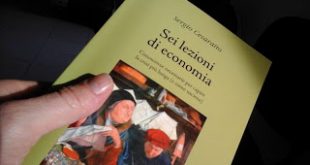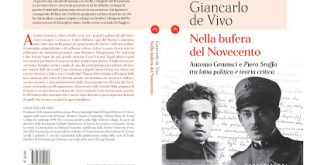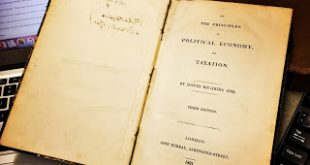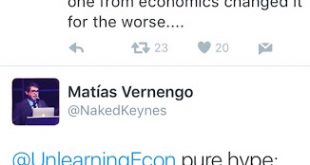The Review of Political Economy has done a great service to those interested in political economy, and in particular those concerned with the revival of the surplus approach. It has published the manuscript of Pierangelo Garegnani's unpublished paper.From Fabio Petri's introduction: In the last year of his life, Pierangelo Garegnani (1930–2011) worked on revising a paper on Marx’s labour theory of value drafted 30 years before, which had remained unpublished. This revised paper is what...
Read More »Le Sei lezioni nella Pampa
Le Sei lezioni di economia sono state tradotte in spagnolo dagli amici argentini e verranno presto pubblicate. Sperabilmente seguirà un'edizione per la Spagna. Pubblichiamo l'introduzione all'edizione argentina che fa il punto della situazione economico-politica a due anni dall'uscita del libro. Introduzione all’edizione argentina Sergio Cesaratto Questo libro è nato in un particolare momento storico per l’Italia. L’elevato tasso di sviluppo economico del secondo dopoguerra è...
Read More »Nerio Naldi sul libro di De Vivo dedicato a Sraffa e Gramsci
Pubblichiamo la recensione del prof. Nerio Naldi, che da tempo è il "biografo ufficiale" di Piero Sraffa, al volume di Giancarlo De Vivo dedicato a Sraffa e Gramsci, già da noi recensito su Micromega con un commento successivo di Ernesto Screpanti. Ringrazio il prof. Carlo D'Ippoliti e Moneta e credito per l'autorizzazione.DE VIVO G. (2017), Nella bufera del Novecento. Antonio Gramsci e Piero Sraffa tra lotta politica e teoria critica, Roma: Castelvecchi, pp. 170.Il libro di Giancarlo...
Read More »Fra Sraffa e Gramsci. Venerdì 9 marzo alla Sapienza
Gramsci e Sraffa, un legame profondo fra lotta politica e teoria critica
Pubblichiamo la recensione a un libro di Giancarlo De Vivo uscita su Micromega online Tra Gramsci e Sraffa, il sodalizio fra due comunisti indisciplinati Sergio Cesaratto La figura di Piero Sraffa è perlopiù sconosciuta al grande pubblico italiano, persino a quello più colto; appena più fortunata è la figura di Antonio Gramsci. Eppure si tratta di due degli studiosi sociali più straordinari –i più straordinari – che il nostro Paese può vantare nel ventesimo secolo. Il volume di...
Read More »Gramsci, Sraffa e Marx: un commento di Screpanti
In questa bella, rigorosa e approfondita recensione Cesaratto sintetizza così bene gli argomenti sviluppati da de Vivo che verrebbe quasi voglia di dire: letta la recensione non c’è bisogno di leggere il libro. Ma non lo dirò, perché l’opera è veramente importante e va letta con attenzione. E consiglio di leggerla in parallelo con un'altra opera importante: P. Sraffa, "Lettere a Tania per Gramsci" (a cura di V. Gerratana), Editori Riuniti, Roma 1991. Il testo di de Vivo delucida...
Read More »Ricardo’s Principles turns 200!
On Saturday, April 19th 1817 , David Ricardo published The Principles of Political Economy and Taxation (price was 14s, and 700 copies were printed; later editions had 1000 copies each; my copy above is of the 3rd and definite edition published in 1821, and had at least two previous owners, a college and someone in Philly that signed it in 1901). Most comments on the book tend to emphasize things like rent theory and comparative advantage, but those are not central to the main point...
Read More »Archives and the history of economic ideas
For the archives, of course As it maybe be painfully clear by now, posts will remain relatively sparse during the rest of the summer break. I recently attended the History of Economics Society (HES) meetings at Duke University, as I noted here. I attended less sessions that I would have liked, but it was enough to confirm the increasing emphasis that has been accorded to archival research. That is, probably, the result that now, slightly more than a 100 years since the...
Read More »The great economic equations
A few days ago, Unlearning Economics twitted a link to an article on "The 17 equations that changed the world." Only one was an economic equation, The Black-Scholes one, and in all fairness it did not change the world, and is not even a central one in economics. First of all, Nassim Taleb has argued convincingly (for example, here) that Black, Scholes and Merton did not invent the formula, and what they really did was to provide a theoretical justification that was compatible with...
Read More »Robert Paul Wolff on Marx
[embedded content] Robert Paul Wolff always worth. Should read his Understanding Marx. He surprisingly says that Analytical Marxism has taken over Marxism. To get to Marxism he had to learn economics, the classical political economy of the Ricardian kind, and learn linear algebra. Hegelianism was not really central to the message (in my view, but he does say he hates Hegel). Labor Theory of Value explained, but he does not discuss Piero Sraffa's contributions directly here. There is no way...
Read More » Heterodox
Heterodox






